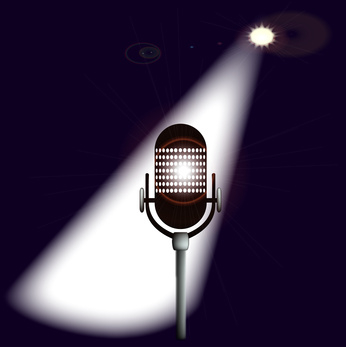
5 Mistakes to Avoid When Presenting Your Work
 Does the idea of reading your work in front of an audience terrify you?
Does the idea of reading your work in front of an audience terrify you?
We’ve been discussing the subject of presenting your work on the Children’s Book Hub this month, and if you answered yes to the above question, you’re not alone. Many writers are drawn to writing because it’s something we can do alone, behind closed doors – in our pajamas, so to speak. It’s a solitary business, and we like it that way. But the truth is, if you’re a published author, you will be expected to read from your work publically from time to time.
Here are just a few of the places you may be asked to present your work:
– Interviews (especially TV, radio and web)
– School visits
– Book signings
– Library “author events”
– Publishing sales group events
– Writers’ workshops
– Conferences and book fairs
Below are five common mistakes writers make when presenting their work in front of an audience. By simply becoming aware of them, you can take the first step toward presenting your work with greater ease and authority…
- Assuming that because you wrote it, you know it well enough to read cold – You’d be surprised how often writers make this mistake. Rehearsing, out loud and often, is the best way to ensure a smooth and successful read.
- Reading too fast – Another very common mistake. Slow down! Let your thoughts and ideas ‘land.’ Give your audience time to hear and visualize what you’re saying.
- Hiding the eyes – Cliché, I know, but the eyes really are the windows to the soul, and thus the key to making a connection with an audience. Don’t keep them glued to the page. Look up and out from time to time – make eye contact with someone in the audience and speak to them. Also, if your hair has a tendency to fall over your eyes, wear it up or style it in such a ways that you don’t have to constantly brush it away with your hand.
- Putting on a ‘reading voice’ – I’m not referring to character voices. I’m talking about the sing-song, lilting, lyrical or self important tones writers often ‘put on’ for readings. This actually has the effect of distancing your audience. Another problem is ‘up-talk’ at ends of lines – as if there’s an implicit “right?” or “are you with me?” at the end of your sentence. Give each thought the opportunity to have its full impact by allowing it to end with a vocal ‘period,’ rather than leaning into the next one with an implied comma or question mark.
- Diffusing energy and focus – Nervous energy has a way of leaking out. Shifting feet and fidgety hands often result from trying to manage or expel some of this energy, but the end result is distracting and actually serves to scatter your energy. A better choice is to ground yourself, feet connected to the earth, and hands relaxed, or anchored to the podium or page. Focus your energy on the intention behind your words, not the tension in your body.
